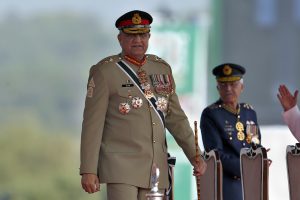U.S. President Joe Biden described Pakistan as “one of the most dangerous nations in the world” at a Democratic Congressional Campaign Committee fundraising dinner on October 13. He corroborated those remarks with the claim that the country has “nuclear weapons without any cohesion.” Biden’s comments sparked a backlash from both the government and the opposition in Pakistan, with the U.S ambassador in Islamabad summoned for explanation.
The American curveball came at a time when Pakistan’s leadership is preoccupied with its most far-reaching decision: appointing the chief of its all-powerful military. As General Qamar Javed Bajwa’s term comes to an end this month, the entirety of Pakistan’s political narrative, along with the correlated conflicts and paradoxes, is centered around who his successor is going to be.
Among those who retorted to the U.S. president last month was former Prime Minister Imran Khan. This was despite the fact that Khan himself in April, a week after he had been ousted via a no-confidence motion, had said Pakistan’s nukes “aren’t safe under the new government,” prompting a strong reaction from the military. Khan, like the military, has demonstrated no qualms in pushing the country under the bus for his own perceived benefits. And today, it is Khan and the military that are the two epicenters of Pakistan’s multipronged political incoherence, which manifests in the discourse surrounding the army chief’s appointment and the global skepticism surrounding Pakistan’s security.
In the seven months since Khan’s ouster, he has been at loggerheads with the military establishment, which continues to orchestrate its cycle of churning civilian leaders in and out of power. The central government, led by the Pakistan Muslim League-Nawaz (PML-N), which itself was a victim of the military’s engineering in 2018, is currently tasked with doing the military’s bidding so as to reaffirm the army’s hegemony.
“The involvement of the establishment in politics throughout our history is known to all. Things remain stable only when [the military] remains in its limits and accepts civilian leadership,” Pakistan Tehreek-e-Insaf (PTI) Central Vice President Ejaz Chaudhary told The Diplomat.
Immediately after his ouster Khan, himself a recent beneficiary of the military’s machinations, claimed that his ouster was the result of a U.S.-led conspiracy in which the army leadership is complicit. Khan’s critics insist that his narrative, which doubles down on absolutist populism, is destabilizing the country, despite the military’s historical maneuvers safeguarding the institution’s own interests.
“Imran has massively destabilized Pakistan by making the appointment of the next chief controversial by saying that any chief not appointed by him personally would not be acceptable to his party and supporters who constitute a very significant section of the voting population,” former Punjab chief minister and political analyst Najam Sethi, the author of “Trial of Democracy,” told The Diplomat.

































